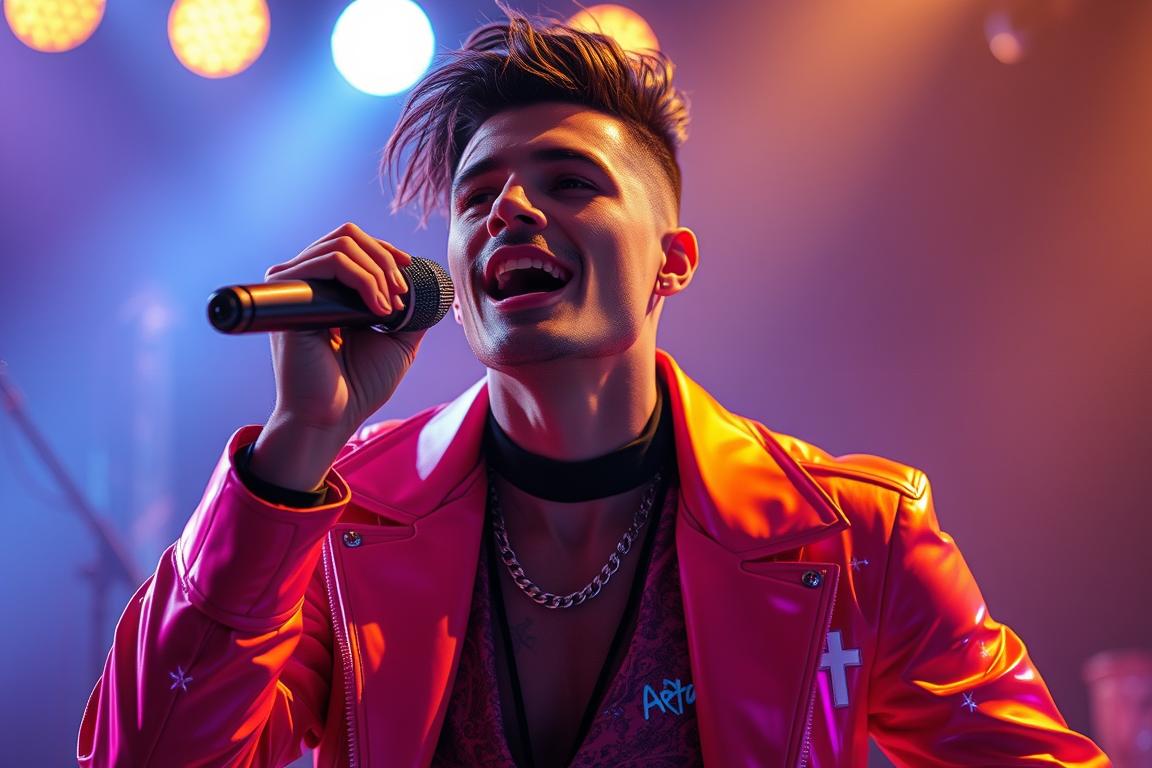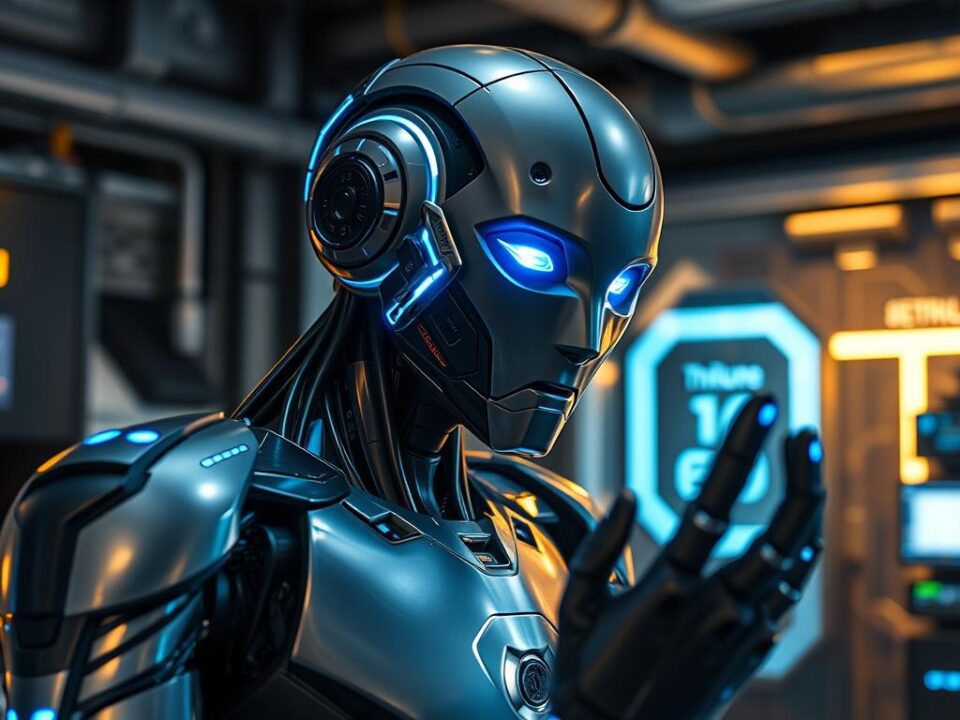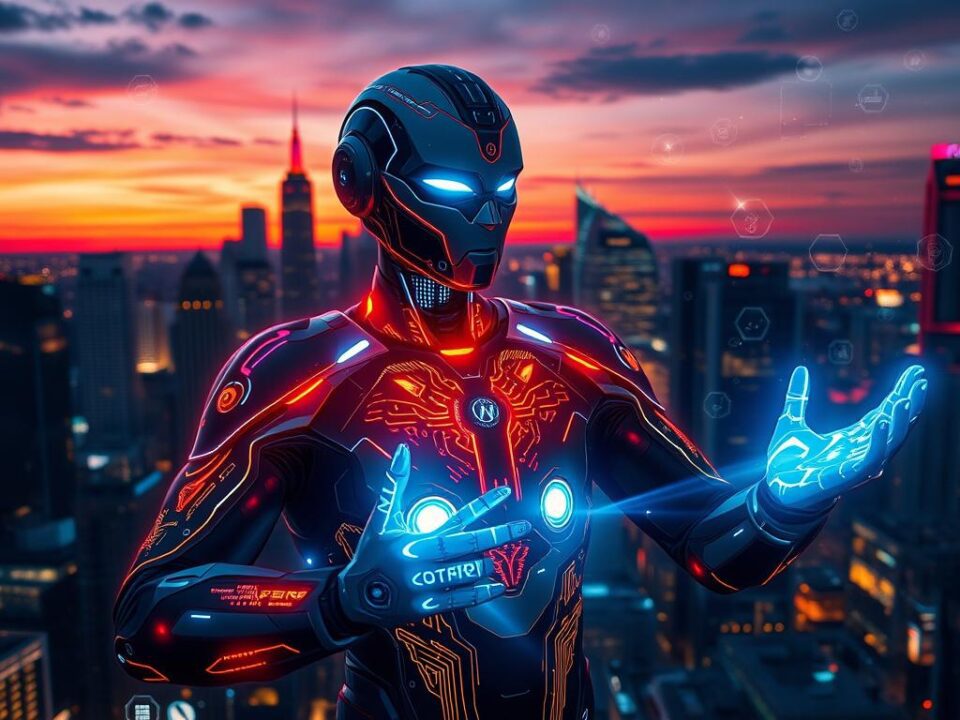The music world is changing fast with AI virtual singers like Vox leading the way. These AI stars bring amazing digital concerts right to your screen. You can enjoy great music instantly, without waiting for live shows or long recording times.
Places like VOX Factory make making music faster and cheaper. This changes how we enjoy live music, making it more accessible and exciting.
Technology is making live music even more special with virtual concerts. Stars like Ariana Grande and Snoop Dogg have tried out recorded shows in VR. This lets fans feel like they’re right there in the concert.
Platforms like TheWaveVR work with artists to create special VR worlds for concerts. These shows offer cool visuals, interactive fun, and a chance to connect with others. It’s a new way to enjoy live music that’s unlike anything before.
What is an AI Virtual Singer?
In the fast-changing world of music tech, AI virtual singers are making waves. These digital stars are made with advanced AI, motion capture, and modeling. They bring a unique and exciting musical experience to fans. AI virtual singers can look and sound like our favorite artists.
Luo Tianyi is a great example. He’s a vocaloid from Bplats Inc and Shanghai Henian Information Technology Co. Luo Tianyi and others use synthesized voices, often based on real actors. They can perform in big TV events and master many music styles, from pop to rock.
AI virtual singers are changing the music scene. They can make new songs, sound like famous artists, and even work with real musicians. This mix of human and artificial music is exciting and new.
“The collaboration between AI singers and human musicians opens up new possibilities for music creation and artistry.”
The use of virtual singer AI, digital vocalist, and AI music technology is changing music. It offers personalized experiences, breaks creative limits, and makes music more accessible to everyone.
The Rise of Virtual Concerts
The music world has changed a lot lately. Virtual concerts have become very popular, especially in China. Events like the Bilibili Macro Link-Virtual Release 2020 showed 30 virtual entertainers from China and Japan. The Vox Ultima concert, held online by Bilibili and Shanghai Media Group, also showed how much people love virtual concerts. It featured virtual idols performing in digital worlds.
Several things have helped virtual concerts grow. The COVID-19 pandemic made people turn to online events. TikTok and Snapchat introduced live concert streaming to younger people. Famous artists like Imagine Dragons and Mariah Carey have also started doing virtual concerts. This has made virtual concerts more accepted.
Virtual concerts have many good points. They help people from different ages come together and enjoy music. They also give artists new ways to make money, like selling tickets and merchandise. Companies like 6Connex help with tracking sales and marketing, making virtual concerts a good choice for the music industry.
“Virtual concerts have become a paradigm-shifting phenomenon, offering a new era of immersive and accessible music experiences.”
The future of virtual concerts looks bright. New technologies like AI and virtual reality will make performances even better. The music industry’s use of these digital tools will change how we enjoy live music.
Meet Vox: Your AI Virtual Singer
Vox is an advanced AI virtual singer with unique features. It can perform without getting tired, 24/7, and in many places at once. Vox’s technology lets it control its voice and style precisely, offering consistency and versatility that humans can’t always match.
Vox can easily change its voice to fit any musical style. It can go from strong and loud to soft and quiet, making it perfect for any song or mood. This flexibility is hard for human artists to achieve.
Vox also has advanced noise reduction and audio extraction. This means it can clone voices with over 98% accuracy. It can blend with live music or pre-recorded tracks, creating a smooth and engaging experience for listeners.
Vox doesn’t face the same limits as AI vs. human singers. It doesn’t need to rest or deal with physical limits. This lets Vox explore new ways of singing and performing. As music evolves, Vox shows the power of virtual vocalist features and artificial intelligence.
Benefits of AI Virtual Singers
The rise of AI virtual singers, like Vox, brings many advantages to the music world. They are very cost-effective for artists and producers. This is because they don’t need physical recording sessions. They can make vocals on demand, making the creative process faster and cheaper.
This technology also increases accessibility for people everywhere. Fans can enjoy performances no matter where they are. This is a big change for the music industry.
AI virtual singers can also be brand ambassadors, like Luo Tianyi. They can promote products without getting tired like real artists do. This new way of marketing is efficient and fun, connecting fans with their favorite virtual performers in exciting ways.
“AI-driven platforms like Amper Music, AIVA, and Jukedeck represent a significant shift in music creation, offering automated mixing and mastering services using AI algorithms.”
AI virtual singers offer more than just cost and accessibility benefits. They also enhance the live performance experience. AI tools improve sound, lighting, and visual effects in real-time. This makes shows more immersive and engaging.
As the music industry grows, AI virtual singers will open up new possibilities. They promise to bring more creativity, efficiency, and fan engagement to the table.
Creating an AI-Powered Concert Experience
The world of live music is changing fast, thanks to AI. AI is making concerts better with virtual singers and new digital tools. This technology is changing how we enjoy live shows.
VOX Factory is leading this change. It offers web-based tools for making AI vocals. These tools help artists create virtual singers that sound real and blend with live music.
AI is also changing how we plan virtual events. VOX Factory has tools for organizing online concerts. These tools make sure the concerts are smooth and fun for everyone.
Events like the Bilibili Macro Link-Virtual Release show AI’s impact. They create digital worlds that pull audiences into the show. This changes what a live concert means.
“AI is transforming the live music industry, empowering artists to push the boundaries of what’s possible and captivating audiences like never before.”
AI is making live music more exciting and personal. As AI use grows, concerts will be more dynamic and tech-savvy. AI is here to stay, changing how we enjoy music online.
Engaging Fans with AI Music
The music world is changing fast, thanks to AI. AI is making concerts more interactive and fun for everyone. This is a big deal for fans.
AI lets us have virtual concerts that feel real. These shows have cool features like live chats and meet-and-greets. Fans can even pick how they watch the concert. AI chatbots help make talking to artists easy and fun.
Creating a strong AI music community is also key. Places like Bilibili have virtual idols with millions of fans. Fans can even help make music with AI tools.
“In 2024, AI is changing how musicians engage with fans and enhancing the fan experience.”
Platforms like SoundCloud use AI to understand what fans like. They suggest music that fans will love. This makes fans happier and gives artists useful feedback.
- Virtual concerts offer immersive experiences with real-time chat, virtual meet-and-greets, and customizable viewing options.
- AI-driven chatbots facilitate seamless communication between fans and artists, enhancing the interactive experience.
- AI music communities empower fans to participate in the creative process, such as composing songs using AI-powered vocal databases.
- AI-powered platforms analyze fan behavior and preferences to suggest personalized content, improving the fan experience and providing valuable insights to artists.
By using AI, musicians can connect better with their fans. This makes music more personal and fun, building loyalty and excitement.
Challenges of Using AI in Music
The AI music revolution is growing fast, but it faces big challenges. Keeping the connection between virtual performers and their fans is a major worry. Some fear that too much focus on AI idols could harm real human bonds and true art.
There’s also a big legal issue with AI music. Questions about copyright, ownership, and rights are tough for the industry. Using AI voices based on real artists’ sounds raises concerns about exploiting their work. The music world is trying to figure out how to protect everyone’s rights.
People have different views on AI in music. Some love it, while others are more cautious. There are worries about the realness of AI shows and how fans might be taken advantage of. As AI gets better, the music world must find a way to keep art real and protect musicians’ rights.
“The use of generative AI in music has raised concerns about identity theft and the devaluation of music. People are using AI models to analyze artists’ songwriting styles and create new music that mimics their signature sound.”
Even with challenges, AI in music is very promising. It can make music creation easier, faster, and more exciting. To make AI work well in music, artists, tech companies, and lawmakers need to work together. This way, AI can be used in a way that respects everyone’s rights and creativity.
The Future of AI Virtual Singers
The future of AI virtual singers is bright. The music world is embracing AI in many ways. This includes virtual concerts and new music styles influenced by AI.
In China, virtual idols are becoming more popular. They show a global interest in music with a tech twist. As AI gets better, these virtual singers will offer more advanced shows. They will mix old music styles with new tech.
AI is changing more than just virtual singers. It’s also changing how we find music and make it. AI could lead to new music styles that mix human creativity with tech.
“AI can compose entire songs in seconds by analyzing data on genre, emotions, styles, and specific instruments. Sony used Flow Machine’s AI to create a ‘new’ Beatles song based on existing music data.”
Some worry AI might limit creativity. But, it can actually help musicians by doing some tasks for them. It also helps artists understand what people want by analyzing trends.
The music world is set for big changes with AI virtual singers. We’ll see new bands and K-pop groups with AI members. The future of AI music is full of possibilities.
The line between real and virtual music is getting smaller. The future of AI virtual singers is exciting and full of new stories in music.
Conclusion: Embracing the AI Music Revolution
The AI music revolution, shown by virtual singers like Vox, is changing live entertainment. It brings new creative options, makes things more accessible, and finds new ways to connect with people. But, we must find a balance between AI’s benefits and the realness of human performances.
The music world is growing, and it will mix AI with human creativity. This mix will make music experiences better, not worse. By welcoming this AI music change, we can celebrate artists’ talents and use AI to make concerts even more special.
The market for AI in music is set to hit $6.80 billion by 2026. The market for vocal enhancements and synthesis is growing fast, at 28.6% CAGR. This means a big change is coming to the music industry. By using AI wisely and ethically, we can open up new ways to innovate, engage fans, and create a world where human talent and tech work together.







